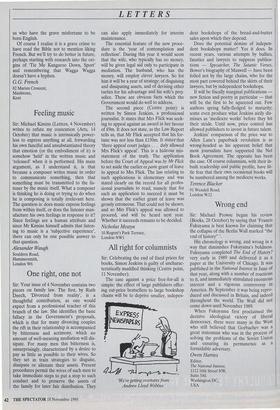One right, one not
Sir: Your issue of 4 November contains two pieces on family law. The first, by Ruth Deech, 'Divorced from reality', is a thoughtful contribution, as one would expect from a professional teacher of this branch of the law. She identifies the basic fallacy in the Government's proposals, which is that for many divorcing couples the rift in their relationship is accompanied by bitterness and acrimony, which no amount of well-meaning mediation will dis- sipate. For many men this bitterness is, unsurprisingly, characterised by a desire to pay as little as possible to their wives. So they set in train strategies to disguise, dissipate or alienate their assets. Present procedures permit the wives of such men to take immediate steps to put a stop to such conduct and to preserve the assets of the family for later fair distribution. They can also apply immediately for interim maintenance.
The essential feature of the new proce- dure is the 'year of contemplation and reflection'. During this year it would seem that the wife, who typically has no money, will be given legal aid only to participate in mediation. The husband, who has the money, will employ clever lawyers. So for him it will be a year of strategy; of disguising and dissipating assets, and of devising other tactics for his advantage and his wife's prej- udice. These are obvious facts which the Government would do well to address.
The second piece (Centre point) is written by Simon Jenkins, a professional journalist. It states that Mrs Flick was seek- ing to appeal against an award in her favour of £9m. It does not state, as the Law Report tells us, that Mr Flick accepted that his for- tune was not less than f150m. It states' that `three appeal court judges . . . duly allowed Mrs Flick's appeal'. This is a hideous mis- statement of the truth. The application before the Court of Appeal was by Mr Flick to set aside the earlier ex parte grant of leave to appeal to Mrs Flick. The law relating to such applications is elementary and was stated clearly on the record for all profes- sional journalists to read, namely that for such an application to succeed it must be shown that the earlier grant of leave was grossly erroneous. That could not be shown, and so Mrs Flick's appeal was allowed to proceed, and will be heard next year. Whether it succeeds remains to be decided. Nicholas Mostyn
10 Regent's Park Terrace, London NW1


















































































 Previous page
Previous page